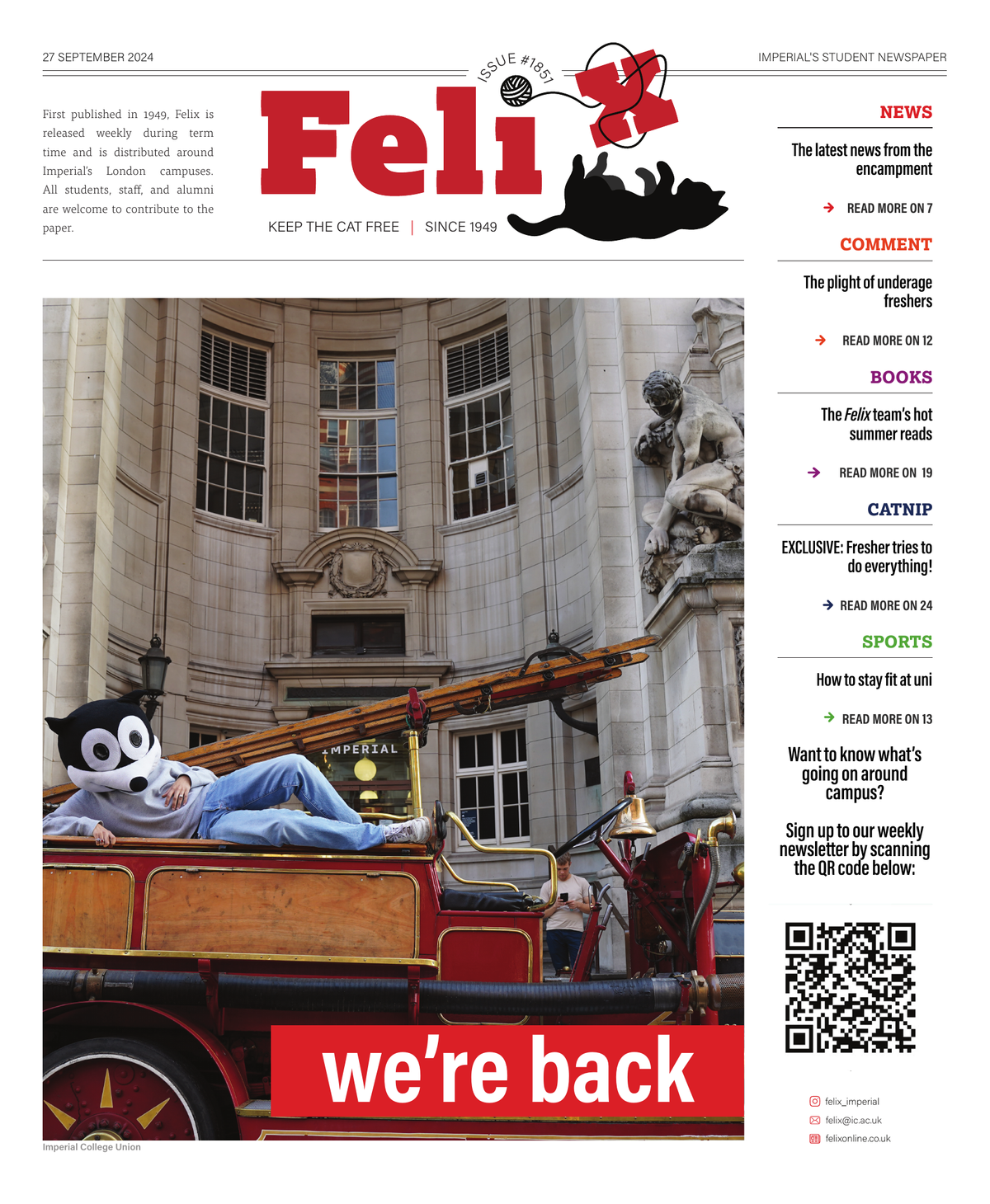Underage and overlooked
Every year, the youngest Freshers miss out on most of the fun at Welcome Week – and the chance to meet peers from other halls and departments.
Entering university before the legal age comes with its perks. The guarantee of obtaining a room of one’s own, access to a slightly less extortionate Oyster deal, not to mention considerable bragging rights, are privileges enjoyed by Freshers still subject to the historical “taxation without representation”. Alas, it seems no one is exempt from the popular adage that gains in comfort are only ever achieved at the expense of freedom, as they are bound to find out.
Welcome Week, organised by Imperial College Union, comprises a series of events designed to integrate new students into university life, familiarise them with a city many have never lived in before, and offer some entertainment before the workload piles up. All tickets for these events are released and easily purchased on the Union’s website. This also allows for systematic screening of the partygoers, as the system automatically detects the age of the student who visits the page. Quite understandably, an age limit is applied to the flagship Freshers’ events, which include a batch of club nights traditionally held at iconic venues in London’s nightlife scene.
However, the same restriction is too common for other events within Imperial. In these cases, the underlying reason is far less obvious. On-campus socials are mostly independent from external regulations, and offer a one-off chance to meet future peers, hallmates, and students from other faculties. After Freshers’ Week, opportunities to meet people from other courses become scarce, as Imperial’s reputation suggests. Most strikingly, underage students trying to buy an entry to the Halls Mixers, advertised in 2023 as “THE night to get to know your fellow neighbours, [and] meet new faces”, will only be met with a stubborn error message, and miss out on what will be the starting point of decisive relationships for many who attend.
In total, just over half of the Union-sponsored hours of socialising a Fresher can look forward to this year are not available to under-eighteens, including all events of the first weekend. Of the remaining events, one is targeted at international students, and one starts with a five-kilometer-long race, which, although an enticing idea, might seem daunting to the less athletic. Excluding the Welcome Fair, this leaves just three occasions to meet new faces. Realistically, these might see a lower attendance. The other Freshers, weary after a festive first weekend, could be tempted to snub these later events with a less obvious focus on socialising, and less vibrant titles (“Beit Farm” has arguably less of a festive ring than “VK House Party”).
The unhappy few
The issue is of direct concern to a rather restricted group. Although Imperial does not release data regarding the age of incoming students specifically, the most recent statistical report (from the 2020-2021 academic year) identifies approximately 50 underage undergraduate students in total, the vast majority of which reasonably can be assumed to be in their first year of study. This number pales in comparison to the total number of incoming undergraduates, which revolves around 3000 yearly. Raising this issue is thus not an attempt at discrediting the effort that is already put into Welcome Week, which would be ungrateful to the Union’s dedication to making integration as smooth as possible. Most freshers keep fabulous, albeit hazy, memories of this modern rite of passe, and its characteristic assortment of tolerated excesses. But again, most freshers are over eighteen, and equality should not have any regard for numbers.
Fully integrating underage students into these famously rowdy events while respecting British laws protecting minors would make these events more challenging to organise and control. The unlawfulness of selling alcohol to minors explains why they are unwelcome in many venues, including those on campus, although legally 16- and 17-year-olds can enter nightclubs if accompanied by their older peers. Universities have also grown increasingly wary of scandals and denunciation, in the wake of the social movements that shook them in the last years, and amidst the recent backlash against hazing. A fear of any incident involving minors may well have contributed to the current strictness.
Nevertheless, since the Equality Act 2010 prohibits educational institutions from discriminating against applicants based on age, and given Imperial’s longstanding commitment to the welcoming of all profiles, arrangements should be made. Agreeing that the isolation of younger students – whatever their number – in the first week of university has no impact on the fostering of communal bonds, or the creation of diverse social groups, requires either abundant imagination or blatant dishonesty. This is especially true as the culture of gap years is not as strong in many foreign countries, meaning the sidelined students are more likely to be international, adding the burden of a potential language barrier or culture shock.
You reached for the secret too soon
Some may point out that underage Freshers have made the choice not to delay their entry to university, but we can hardly make the case that it is an eccentric idea to start studying as soon as one possibly can. After all, “I challenge the status quo and seek better ways of […] having an impact” is one of the “positive behaviours” encouraged by Imperial.
Working around the practical details of a universally welcoming integration week is possible without introducing too much complexity. Many hall-specific events already use a bracelet system that allows bar staff to quickly identify those entitled to alcohol consumption, ensuring all residents can join in. Bracelet allocation does not significantly increase queuing time, as identification checks at the entrance of these events are already standard practice.
Obviously, clubbing events in external venues, which remain most popular, should neither be abandoned nor open to underage students. Instead, more events designed to bring newcomers together should be introduced to compensate, be they copies of the existing events with regulated access to alcoholic drinks.
A quantum of solace
At any rate, if even considered, these changes won’t be enacted in time to benefit this year’s Freshers. In fact, the issue is unlikely to become more relevant. The proportion of school students who skip a year consistently hovers around a single percent, and most forecasts agree that the enrollment of international students (a subgroup more likely to enter university before eighteen) has peaked in the past year.
What can then be done? While it is an open secret that the meticulousness and prevalence of age-checking at the Union Bar drop significantly after Fresher’s Week, making these previous restrictions somewhat hypocritical, lying about your age in such a context remains illegal, and certainly not advisable.
Instead, those who – either by choice or by a lack thereof – miss out on the wildest nights out should focus on the Welcome Fair, and leverage the uniquely wide range of clubs and societies offered to them. It remains the best way to make meaningful bonds in circumstances that are less harmful to the liver, eardrums, and reputation.










